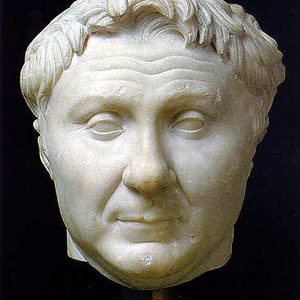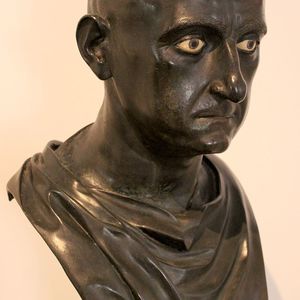Ancient Roman Names
Choosing a name to create a cohesive reconstructed image is actually a more complex question than it may seem. In ancient Rome, the structure of a name was influenced not only by gender but also by a person's origin, family occupation, place of residence, achievements, and personal qualities. A complete Roman male name usually consisted of three parts: the personal name, or praenomen, the family name, or nomen, and an individual nickname or branch name, cognomen. Women often had only a personal and family name, with the exception of noble or married women who added their father's or husband's cognomen to their name. Slaves, on the other hand, were not considered full members of society and were more like pets, having only one given name.
Praenomen
The praenomen, or personal name, is analogous to a modern given name for men. Romans had a rather limited number of personal names. In inscriptions, personal names were almost always abbreviated.
| Praenomen | Reduction/Note |
|---|---|
|
Appius |
App. Appius; according to tradition, this name originated from the Sabine name Atta and was brought to Rome by the Claudian family. |
|
Aulus |
A. or Avl. Aulus; colloquially, an archaic form Olus existed, so the abbreviation for this name can also be O. |
|
Decimus |
D. or Dec. Decimus; archaic form Decumos; from the ordinal numeral "tenth." |
|
Gaius |
Gaius; rarely abbreviated as G. |
|
Gnaeus |
Gnaeus; archaic form Gnaivos; rarely abbreviated as Gn.; alternative forms include Naevus, Naeus. |
|
Kaeso |
Kaeso |
|
Lucius |
Lucius; archaic Loucios from "lux" meaning light. |
|
Mamercus |
Mam. Mamercus; a name of Oscan origin, used only in the gens Aemilia. |
|
Publius |
Publius; archaic form Poblios, abbreviated as Po. |
|
Quintus |
Q. Quintus; colloquially, Cuntus; alternative forms include Quinctus, Quintulus; from the ordinal numeral "fifth." |
|
Servius |
Ser. Servius |
|
Spurius |
Ser. Spurius. |
|
Titus |
T. Titus |
|
Tiberius |
Ti. or Tib. Tiberius, from the Tiber River on which Rome stands. |
Other names were rare and usually written in full: Agrippa, Ancus, Annius, Faustus, Lar, Nero, Numa, Opiter, Primus, Proculus, Secundus, Septimus, Tertius, Tullus, Vopiscus.
A boy received his personal name not immediately, but on the 8th or 9th day after birth. There was a tradition of giving personal names only to the four eldest sons, while the others could be given ordinal numerals as their personal names: Quintus (fifth), Sextus (sixth), Septimus (seventh), Octavus (eighth), Nonus (ninth), and Decimus (tenth). Over time, these names became commonly used and, in other words, turned into personal names. In other words, a person bearing the name Quintus did not necessarily have to be the fifth son in the family. As an example, we can recall the military commander and politician Sextus Pompey, the second son of Gnaeus Pompeius Magnus, a member of the first triumvirate.
Often, the eldest son received his father's praenomen. In 230 BCE, this tradition was solidified by a decree of the Senate, which resulted in the father's personal name being passed down to the eldest son in most cases. For example, the Emperor Octavian Augustus bore the name Gaius, just like his great-great-grandfather, great-grandfather, grandfather, and father.
In some families, a limited number of personal names were used. For example, the Cornelii Scipiones had only Gnaeus, Lucius, and Publius, while the Claudii Neros had only Tiberius and Decimus, and the Domitii Ahenobarbi had only Gnaeus and Lucius.
A criminal's personal name could be permanently excluded from the gens (family line) to which they belonged. For this reason, the name Lucius was not used in the patrician gens (family) of the Claudii, and the name Marcus was not used in the patrician gens of the Manlii. By decree of the Senate, the name Marcus was forever excluded from the gens Antonia after the fall of the triumvir Marcus Antonius.
Nomen
The nomen, or gentile name, was the name of the gens (clan) and roughly corresponded to a modern surname. It was indicated in the form of a masculine adjective and, in the classical era, ended with -ius: Tullius - Tullius (of the Tullii gens), Iulius - Julius (of the Julian gens); in the Republican period, endings such as -is and -i were also encountered. Non-Roman names had different endings from those mentioned.
In inscriptions, gentile names were usually written in full. During the Imperial period, only the names of very famous gens were abbreviated: Aelius - Ael., Antonius - Ant. or Anton., Aurelius - Avr., Claudius - Cl. or Clavd., Flavius - Fl. or Fla., Julius - I. or Ivl., Pompeius - Pomp., Valerius - Val., Ulpius - Vlp.
According to Varro, the total number of gentile names reached a thousand. Most gentile names have such ancient origins that their meanings have been lost. Information about very few names has been preserved, allowing us to understand their meanings. For example, Asinius from asinus (donkey), Caelius from caecus (blind), Caninius from canis (dog), Decius from decem (ten), Fabius from faba (bean), Nonius from nonus (ninth), Octavius from octavus (eighth), Ovidius from ovis (sheep), Porcius from porca (pig), Septimius from septimus (seventh), Sextius and Sextilius from sextus (sixth), Suillius from suilla (pork).
From the 1st century BCE, due in part to the transition from a republican form of government to autocracy, an interesting tendency emerged in Rome. Individuals who held significant power began to justify their legitimacy by tracing their ancestry back to ancient kings and heroes. For example, Julius Caesar claimed that his paternal lineage traced back to the gods: Jupiter - Venus - Aeneas - Iulus - the gens Julia, while his maternal lineage descended from kings, with Anca Marcius being the ancestor of the Marcii Reges (Latin for "kings").
Cognomen
The cognomen, or individual nickname, given to someone in the gens, often passed down to their descendants and became the family name or the name of a specific branch of the gens. For example, Cicero - Cicero, Caesar - Caesar. As an example, within the Cornelii gens, there were families such as the Scipiones, Rufini, Lentuli, and others. Having a cognomen was not obligatory, and in some plebeian families (such as the Marii, Antonii, Octavii, Sertorii, etc.), personal nicknames were generally absent. However, the absence of a cognomen was an exception to the rule since many Roman gentes were of such ancient origin that each had several branches.
Since the personal name of the father passed down to the eldest son, a third name had to be used to distinguish the son from the father. Inscriptions mention individuals like Lucius Sergius Primus, Quintus Aemilius Secundus. In one inscription, the grandfather, son, and grandson are named Quintus Fulvius Rusticus, Quintus Fulvius Attianus, and Quintus Fulvius Carizianus.
Cognomina emerged much later than personal and gentile names, so their meanings are generally understood. They could indicate the origin of the gens (e.g., the Fufii who migrated to Rome from the Campanian town of Cales and hence had the cognomen Calenus), memorable events (in the plebeian gens Mucii, the cognomen Scaevola, meaning "left-handed," appeared after Gaius Mucius burned his hand in the fire during the war with the Etruscans in 508 BCE, impressing the enemies and their king, Porsenna), physical appearance (Crassus - fat, Laetus - plump, Macer - thin, Celsus - tall, Paullus - short, Rufus - red-haired, Strabo - cross-eyed, Nasica - sharp-nosed, etc.), or character traits (Severus - severe, Probus - honest, Lucro - glutton, etc.).
Agnomen
There have been cases where a person had two nicknames, and the second one was called an "agnomen" (Latin: agnomen). The emergence of the agnomen was partly due to the fact that the eldest son often inherited all three names from his father, resulting in several individuals within the same family having the same names. For example, in the family of the famous orator Marcus Tullius Cicero, his father and son had exactly the same name.
The agnomen was often a personal nickname, especially when the cognomen was hereditary. Sometimes a Roman would receive an agnomen for great achievements or special merits. Publius Cornelius Scipio, in honor of his victory over Hannibal in Africa in 202 BCE, became known as "Africanus" (Latin: Africanus). Lucius Aemilius Paullus received the nickname "Macedonicus" for his victory over the Macedonian king Perseus in 168 BCE. The dictator Lucius Cornelius Sulla added the agnomen "Felix" (fortunate) to his name, so his full name became Lucius Cornelius Sulla Felix. The agnomen "Felix" later became hereditary in his family (Faustus Cornelius Sulla Felix, consul in 52 CE).
As a rule, the agnomen was possessed by members of ancient and noble families that had many branches and cognomina. In such families, the cognomen sometimes merged with the family name and was used together with it to designate the gens. The well-known plebeian gens Caecilii had the ancient cognomen "Metellus," the meaning of which is lost. This cognomen merged with the name of the gens, which came to be known as "Caecilii Metelli." Naturally, almost all members of this gens had an agnomen.
The patrician gens Cornelia had many branches. One of its members received the nickname "Scipio" (a staff or cane) because he served as a guide and support for his blind father, essentially acting as a staff. The cognomen "Scipio" became fixed for his descendants, and over time, the Cornelii Scipiones occupied a prominent place within their gens and received agnomina. In the 3rd century BCE, Gnaeus Cornelius Scipio received the agnomen "Asina" (she-ass) for bringing a donkey laden with gold as a pledge to the Forum. The nickname "Asina" passed on to his son Publius (Publius Cornelius Scipio Asina). Another member of the Cornelii Scipiones received the nickname "Nasica" (sharp-nosed), which passed on to his descendants and became the name of a branch of the gens, resulting in the Scipiones Nasicae. Naturally, the Scipiones Nasicae also received a third cognomen as a personal nickname, so their full names could consist of five names. For example, Publius Cornelius Scipio Nasica Serapio, who was a consul in 138 BCE. The nickname "Serapio" was given to him by the plebeian tribune Curatius for his resemblance to a merchant of sacrificial animals named Serapis.
Some citizens had two family names as a result of adoption. According to Roman customs, an adopted person took the personal name, family name, and cognomen of the one who adopted them, while retaining their original family name in a modified form with the suffix "-an-", which took the place of the agnomen. Gaius Octavius, the future Emperor Augustus, after being adopted by Gaius Julius Caesar, received the name Gaius Julius Caesar Octavianus - Gaius Julius Caesar Octavian.
Women's names
During the late Republic and the Empire, women did not have personal names. Their feminine name was the feminine form of the family name. For example, Tullia was the feminine form of Tullius (from the Tullius family, for example, the daughter of Marcus Tullius Cicero), Julia was the feminine form of Julius (from the Julius family, for example, the daughter of Gaius Julius Caesar), Cornelia was the feminine form of Cornelius (from the Cornelius family, for example, the daughter of Publius Cornelius Scipio). Since all women within the same family had the same name, they were differentiated by age within the family. When another daughter was born, both daughters would have a prenomen added to their names: Minor (younger) and Major (older). The other sisters would be called Secunda (second), Tertia (third), Quinta (fifth), and so on. The prenomen Minor was used by the youngest daughter.
Married women retained their own name, to which their husband's cognomen was added. For example, Cornelia, daughter of Cornelius, Gracchi, would be Cornelia, daughter of Cornelius, (wife of) Gracchus.
Prominent women could also have their father's cognomen in addition to the family name. For example, Sulla's wife was the daughter of Lucius Caecilius Metellus Dalmaticus and was called Caecilia Metella, and the wife of Emperor Augustus was the daughter of Marcus Livius Drusus Claudianus and was called Livia Drusilla.
In inscriptions, the prenomen and father's cognomen, as well as the husband's cognomen in the genitive case, are sometimes mentioned alongside women's names. For example, "Caeciliae, Q. Cretici f(iliae), Metellae, Crassi (uxori)" means "Caecilia Metella, daughter of Quintus Creticus, wife of Crassus." From the inscription, we can deduce that this woman was the daughter of Quintus Caecilius Metellus Creticus and the wife of Crassus. The inscription is found on a large round mausoleum near Rome on the Appian Way, where Caecilia Metella, daughter of the consul of 69 BCE and wife of Crassus, is buried.
Slave names
In ancient times, individual names did not exist for slaves. Legally, slaves were considered objects rather than subjects of the law, and they were as powerless as any other members of the family. As a result, archaic slave names were formed by combining the personal name of the master, the father of the family, and the word "puer" (boy, son): Gaipor, Lucipor, Marcipor, Publipor, Quintipor, Naepor (Gnaeus + puer), Olipor (Olos - an archaic form of the personal name Aulus).
With the development of slavery, there was a need for personal names for slaves. Most often, slaves retained the name they had when they were free individuals. Roman slaves often had names of Greek origin: Alexander, Antigon, Hippokrat, Diadumen, Museus, Phelodespot, Philokal, Philonik, Eros, and others. Greek names were sometimes given to barbarian slaves as well.
A slave's name could indicate their origin or place of birth: Dacus - a Dacian, Corinthus - a Corinthian, Siro - a native of Syria, Gallus - a Gaul, Frigius - a Frigian. Inscriptions also mention slaves with the name Peregrinus - a foreigner.
Slaves were also given names of mythological heroes: Achilles, Hector. There were cases where slaves were named after plants or stones: Adamant, Sardonik, and similar names. Instead of a name, a slave could have the nickname "First," "Second," "Third."
It is known that Roman slaves were in an extremely oppressed position, but this did not affect their names, meaning that there were no derogatory nicknames. On the contrary, slaves had names like Felix and Faustus (fortunate). Apparently, these nicknames, which became names, were given only to those slaves whose lives were relatively successful. Inscriptions mention Faustus, the baker of Tiberius Germanicus, and Faustus, the overseer of his master Popilius' perfumery, Felix, who was in charge of Gaius Caesar's jewelry, another Felix, the manager of Tiberius Caesar's estates, and yet another Felix, the supervisor in Messalina's woolen workshops. It is known that the daughters of a slave from the Caesars' household were named Fortunata and Felicia.
The name Ingenus or Ingenuus (born free) is also often encountered among slaves. Slaves who were born into slavery sometimes had names like Vitalio and Vitalis (lively).
There were no strict rules for creating slave names, so when purchasing a slave, the official document would include the clause "or by whatever other name he may be called" (Latin: sive is quo alio nomine est).
In inscriptions, the master's name in the genitive case and the slave's occupation are mentioned after the slave's name. The word "servus" (slave) is usually abbreviated as "ser" or rarely "s," and it can also appear between the two cognomina of the master. There is no strict word order. The word "slave" is often absent, especially for female slaves. For example, "Euticus, Aug(usti) ser(vus), pictor" means "Euticus, slave of Augustus, painter." "Eros, cocus Posidippi, ser(vus)" means "Eros, slave cook of Posidippus." "Idaeus, Valeriae Messalin(ae) supra argentum" means "Idaeus, treasurer of Valeria Messalina."
Names of freedmen
A freedman (a slave who has been granted freedom) acquired a personal and family name from their former master, who became their patron, while retaining their previous name as a cognomen. For example, Tiro, Cicero's secretary, after being freed from slavery, was called M. Tullius M. libertus Tiro - Marcus Tullius Tiro, freedman of Marcus. A slave named Apella, who was freed by Marcus Manneus Priscus, became known as Marcus Manneus Apella. A female slave named Basse, freed by Lucius Hostilius Pamphilus, received the name Hostilia Basse (women did not have prenomina). Lucius Cornelius Sulla freed ten thousand slaves who belonged to individuals who perished during the proscriptions. They all became Lucii Cornelii (the famous "army" of ten thousand "Cornelians").
In inscriptions, the names of imperial freedmen can be found: Gaius Julius Eros, the baker; Tiberius Claudius Dipterus, the tailor of theatrical costumes; Marcus Cocceius Ambrosius, in charge of the emperor's triumphal white attire; Marcus Ulpius Euphrosynus, in charge of the emperor's hunting attire; Marcus Aurelius Successus, in charge of the emperor's friends' reception, and others.
In inscriptions, the personal name of the former master is abbreviated in the genitive case and is followed by "l" or "lib" (= libertus), and very rarely the tribe is indicated: Q(uintus) Sertorius, Q(uinti) l(ibertus), Antiochus, colonus pauper - Quintus Sertorius Antiochus, freedman of Quintus, a poor colonus. In rare cases, instead of the personal name of the former master, their cognomen is used: Lucius Nerfinius, Potiti libertus, Primus, lardarius - Lucius Nerfinius Primus, freedman of Potitus, a sausage-maker. Freedmen of the imperial household are indicated in inscriptions with the abbreviation "Avg l" (Avg lib), which stands for Augusti libertus (after the family name or after the cognomen): L(ucio) Aurelio, Aug(usti) lib(erto), Pyladi, pantomimo temporis sui primo - Lucius Aurelius Pyladus, freedman of the emperor, the first pantomime of his time.
Freedmen with two cognomina are rare: P(ublius) Decimius, P(ublii) libertus, Eros Merula, medicus clinicus, chirurgus, ocularius - Publius Decimius Eros Merula, freedman of Publius, a physician-therapist, surgeon, oculist.
In inscriptions, freedwomen are indicated with the abbreviation Ɔ • L (the inverted letter "C" represents the remains of the archaic feminine personal name "Gaia"): L(ucius) Crassicius, Ɔ (=mulieris) libertus, Hermia, medicus veterinarius - Lucius Crassicius Hermia, freedwoman, a veterinary physician.
Freedmen of cities received the name Publicius (from publicus - public) or the name of the city as their family name: Aulus Publicius Germanus, Lucius Saepinius Oriens et Lucius Saepinius Orestus - freedmen of the city of Saepinum in Italy.
Physicians and servants of the deity Aesculapius (Greek: Asclepius) usually bore his name. For example, Gaius Calpurnius Asclepiades, a physician from Prusa near Olympus, who acquired Roman citizenship from Emperor Trajan. However, the name Asclepius, or Asclepiades, did not always belong to a physician: in one inscription, there is Asclepiades, a slave of Caesar, a marble worker.
Freedmen belonging to corporations retained their corporation's name in their own name: freedmen of the corporation of patchworkers and tailors (fabri centonarii) were called Fabricii and Centonii.
Literature
- NAMES IN ANCIENT LATIN INSCRIPTIONS (Fedorova E. V. Vvedenie v latinskuyu epigrafiku [Introduction to Latin Epigraphy]. un-ta, 1982, 256 p. p. 85-101, 2. NAMES OF SLAVES)
- Kajanto I. The Latin Cognomina. — 1985
- Schulze W. Zur Geschichte lateinischer Eigennamen. — 1933







